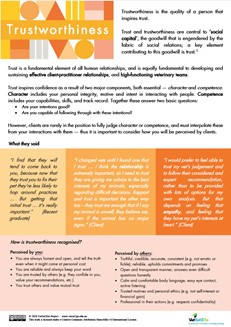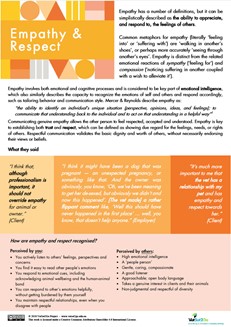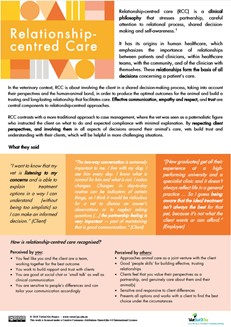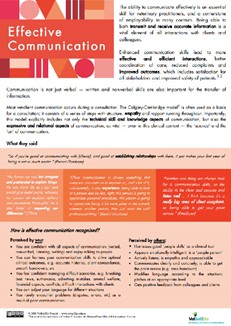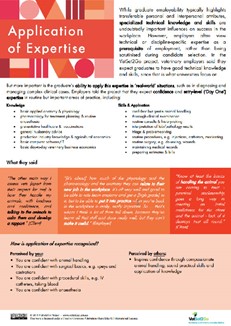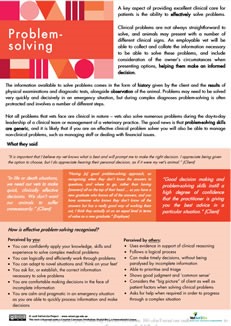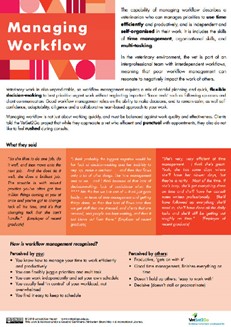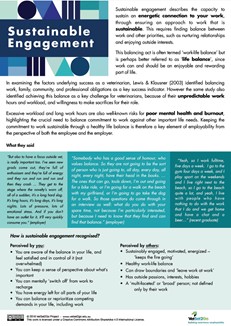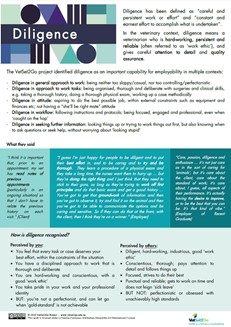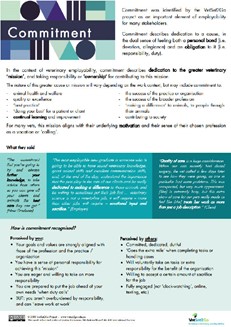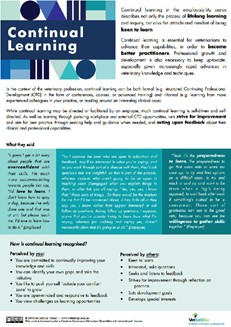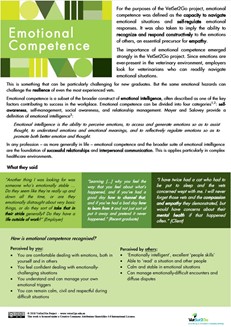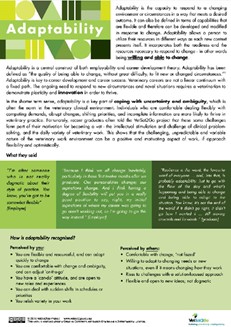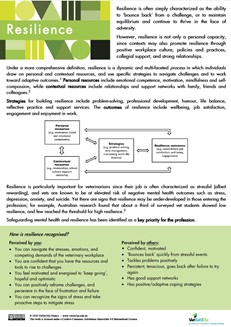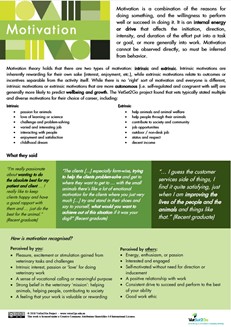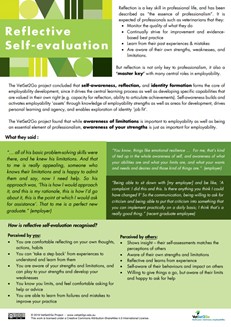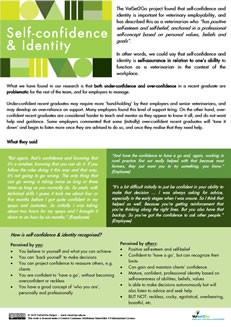
Resources
Read the following resource cards to discover the 18 key capabilities that are consistently important to veterinary employability, as identified by the VetSet2Go project.
These capabilities aligned to 5 broad, overlapping domains defined by their outcome orientation.
Each resource card contains a descriptor of the capability, quotes from stakeholders, a rubric of how the capability is perceived by you and perceived by others, evidence on why the capability is important to employability, possible strategies to enhance the capability, further resources, and references.
Skip to domain:
- Effective Relationships
- Veterinary Capabilities
- Professional Commitment
- Psychological Resources
- Self-awareness
-
Effective Relationships
-
Trustworthiness
Refers to a vet who builds trust through honesty, transparency, integrity.
How it might be perceived by you:
- You are always honest and open, and tell the truth even when it might cost you
- You are reliable and always keep your word
- You are trusted by others (e.g. they confide in you, value your recommendations, etc.)
- You trust others and value mutual trust
How it might be perceived by others:
- Truthful, credible and accurate
- Reliable, upholds commitments and promises
- Consistent (not erratic or fickle)
- Open and transparent manner; answers even difficult questions honestly
- Calm and comfortable body language, easy eye contact, active listening
- Trusted motives and personal ethics (not self-interest or financial gain)
- Professional in their actions (e.g. respects confidentiality)
-
Collaboration & Teamwork
Refers to a vet who fits into and supports an effective veterinary team; works with others collaboratively towards shared goals; is friendly and personable.
How it might be perceived by you:
- You understand how you work in teams and can ‘fit in’
- You enjoy working in teams and social situations
- You are a ‘team player’ – you help others to get the job done together
- You are always mindful of how you impact on others
- You treat others as equals
How it might be perceived by others:
- Good ‘interpersonal skills’ ensuring ‘team fit’
- A ‘team player’ who ‘pitches in’ and does things that aren’t necessarily their job
- Commits to shared goals
- Friendly, personable and considerate
- Humility
-
Empathy & Respect
Refers to a vet who is attentive to others feelings, perspectives and concerns; is non-judgmental, respects diversity of opinion and worldview.
How it might be perceived by you:
- You actively listen to others’ feelings, perspectives and concerns
- You find it easy to read other people’s emotions
- You respond to emotional cues, including acknowledging animal wellbeing and the human-animal bond.
- You can respond to other’s emotions helpfully, without getting burdened by them yourself
- You maintain respectful relationships, even when you disagree with people
How it might be perceived by others:
- High ‘emotional intelligence’; a ‘people person’
- Gentle, caring, compassionate
- A ‘good listener’
- Approachable; open body language
- Clients feel that you take a genuine interest in them and their animals
- Non-judgmental and respectful of diversity
-
Relationship-centred Care
Refers to a vet who bases healthcare approaches in human relationships and decision-making in partnership; respects the human-animal bond.
How it might be perceived by you:
- You feel like you and the client are a team, working together for the best outcome
- You work to build rapport and trust with clients
- You are good at social chat or ‘small talk’ as well as clinical communication
- You are sensitive to people’s differences and can tailor your communication accordingly
How it might be perceived by others:
- Approaches animal care as a joint venture with the owner
- Good ‘people skills’ for building effective, trusting relationships
- Clients feel that you value their perspectives as a partnership, and genuinely care about them and their animal/s
- Sensitive and responsive to client differences
- Presents all options and works with a client to find the best choice under the circumstances
-
-
Veterinary Capabilities
-
Effective Communication
Refers to a vet who is a clear and effective communicator (verbal, non-verbal, written); listens and seeks understanding; confidently; discusses difficult issues including financial aspects of care.
How it might be perceived by you:
- You are confident with all aspects of communication (verbal, non-verbal, listening, written) and enjoy talking to people
- You can harness your communication skills to drive optimal clinical outcomes, e.g. accurate histories, client concordance, smooth hand-overs, etc.
- You feel confident managing difficult scenarios, e.g. breaking bad news, euthanasia, admitting mistakes, animal welfare, financial aspects, conflicts, ‘difficult clients’
- You can adjust your language for different situations
- You rarely encounter problems (disputes, errors, etc.) as a result of poor communication
How it might be perceived by others:
- Harnesses good ‘people skills’ as a clinical tool
- ‘Emotionally intelligent’, a ‘people-person’
- Actively listens, empathic, approachable
- Clear and concise, able to get the point across (e.g. case handover)
- Modifies language according to situation; pitches at an appropriate level
- Gets positive feedback from clients; “clients love him/her”
-
Application of Expertise
Refers to a vet who inspires confidence through compassionate animal handling, sound practical skills, and application of specialized knowledge.
How it might be perceived by you:
- You are confident with the routine knowledge and skills expected in your role, relative to experience (i.e. animal handling, surgical basics (e.g. spey and castrations), procedural skills (e.g. IV catheters, taking blood), anaesthesia)
- You know the level of skills and knowledge expected by the workplace, and can prepare yourself accordingly to confidently deliver a professional service
How it might be perceived by others:
- Inspires confidence through compassionate animal handling, sound practical skills, and application of knowledge
-
Problem-solving
Refers to a vet who evaluates evidence in support of clinical reasoning and problem-solving; can make decisions despite incomplete information; uses good judgment and 'common sense'.
How it might be perceived by you:
- You can confidently apply your knowledge, skills and experience to solve complex medical problems
- You can logically and efficiently work through problems
- You can adapt to novel situations and ‘think on your feet’
- You are comfortable making decisions in the face of incomplete information
How it might be perceived by others:
- Uses evidence in support of clinical reasoning
- Follows a logical process
- Can adapt learning to novel situations
- Can make timely decisions, without being paralysed by incomplete information
- Able to prioritise and triage
- Shows good judgment and ‘common sense’
-
Managing Workflow
Refers to a vet who is self-organised in their work; manages priorities and uses time efficiently and productively; uses initiative; is independent.
How it might be perceived by you:
- You know how to manage your time to work efficiently and productively
- You can flexibly juggle priorities and multi-task
- You can work independently and set your own schedule
- You usually feel ‘in control’ of your workload, not overwhelmed
- You find it easy to keep to schedule
How it might be perceived by others:
- Productive, ‘gets on with it’
- Good time management, finishes everything on time
- Doesn’t hold up others; ‘easy to work with’
- Decisive (doesn’t stall or procrastinate)
-
-
Professional Commitment
-
Sustainable Engagement
Refers to a vet who sustains an energetic connection with their work; balances and refreshes their interest, passion and enthusiasm for work with other needs; is self-sustaining.
How it might be perceived by you:
- You are aware of the balance in your life, and feel satisfied and in control of it (not overwhelmed)
- You can keep a sense of perspective about what’s important
- You can mentally ‘switch off’ from work to recharge
- You have energy left for all parts of your life
- You can balance or reprioritize competing demands in your life, including work
How it might be perceived by others:
- Sustainably engaged, motivated, energized – ‘keeps the fire going’
- Healthy work-life balance
- Can draw boundaries and ‘leave work at work’
- Has outside passions, interests, hobbies
- A ‘multi-faceted’ or ‘broad’ person; not defined only by their work
-
Diligence
Refers to a vet who is hard-working, persistent, reliable; gives attention to detail and quality assurance.
How it might be perceived by you:
- You feel that every task or case deserves your best effort, within the constraints of the situation
- You have a disciplined approach to work that is thorough and deliberate
- You are hard-working and conscientious, with a good ‘work ethic’
- You take pride in your work and your professional identity
- BUT: you’re not a perfectionist, and can let go when ‘gold-standard’ is not achievable
How it might be perceived by others:
- Diligent, hard-working, industrious, good ‘work ethic’
- Conscientious, thorough; pays attention to detail and follows things up
- Focused, strives to do their best
- Punctual and reliable; gets to work on time and rarely feigns ‘sick leave’
- BUT NOT: perfectionist or obsessed with unachievably high standards
-
Commitment
Refers to a vet who is committed to the veterinary mission, including quality care and welfare, and to organisational goals; takes responsibility.
How it might be perceived by you:
- Your goals and values are strongly aligned with those of the profession and the practice/organization
- You have a sense of personal responsibility for achieving this ‘mission’
- You are eager and willing to take on more responsibility
- You are prepared to put the job ahead of your own needs ‘when duty calls’
- BUT: you aren’t overburdened by responsibility, and can ‘leave work at work’
How it might be perceived by others:
- Committed, dedicated, dutiful
- ‘Goes the extra mile’ when completing tasks or handling cases
- Will voluntarily take on tasks or extra responsibility for the benefit of the organisation
- Willing to accept a certain amount of sacrifice for the job
- Fully engaged (not ‘clock-watching’, online, texting, etc.)
-
Continual Learning
Refers to a vet who is keen to learn, open to feedback, and strives for improvement and best practice.
How it might be perceived by you:
- You are committed to continually improving your knowledge and skills
- You can identify your own gaps and take the initiative
- You like to push yourself ‘outside your comfort zone’ to grow
- You are open-minded and responsive to feedback
- You view challenges as learning opportunities
How it might be perceived by others:
- Keen to learn
- Interested, asks questions
- Seeks and listens to feedback
- Strives for improvement through reflection on practice
- Sets development goals
- Develops special interests
- Evidence of continuing professional development
-
-
Psychological Resources
-
Emotional Competence
Refers to a vet who is able to navigate emotional situations and self-regulate emotional responses; remains calm.
How it might be perceived by you:
- You are comfortable dealing with emotions, in yourself and others
- You feel confident dealing with emotionally-challenging situations
- You understand and can manage your own emotional triggers
- You can remain calm, civil and respectful during difficult situations
How it might be perceived by others:
- ‘Emotionally intelligent’, excellent ‘people skills’
- Able to ‘read’ a situation and other people
- Calm and stable in emotional situations
- Can manage emotionally-difficult encounters and diffuse disputes
-
Adaptability
Refers to a vet who is flexible in dealing with change, uncertainty, and shifting priorities; is open-minded.
How it might be perceived by you:
- You are flexible and resourceful, and can adapt quickly to change
- You are comfortable with change and ambiguity, and can adjust ‘on-the-go’
- You have a ‘can-do’ attitude, and are open to new roles and experiences
- You can deal with sudden shifts in schedules or priorities
- You relish variety in your work
How it might be perceived by others:
- Comfortable with change, ‘not fazed’
- Willing to adapt to changing needs or new situations, even if it means changing how they work
- Rises to challenges with a solution-focused approach
- Flexible and open to new ideas; not dogmatic
-
Resilience
Refers to a vet who deals with pressure and adversity; draws on personal and contextual resources, and utilizes strategies to navigate challenges and sustain wellbeing.
How it might be perceived by you:
- You can navigate the stresses, emotions, and competing demands of the veterinary workplace
- You are confident you have the resources and tools to rise to challenges
- You feel motivated and energised to ‘keep going’, hopeful and optimistic
- You can positively reframe challenges, and persevere in the face of frustration and failure
- You can recognize the signs of stress and take proactive steps to mitigate
How it might be perceived by others:
- Confident, motivated
- ‘Bounces back’ quickly from stressful events
- Tackles problems positively
- Persistence, tenacity; goes back after failure to try again
- Has good support networks
- Has positive/adaptive coping strategies
-
Motivation
Refers to a vet who finds motivation and purpose in their work; is self-motivated and intrinsically driven.
How it might be perceived by you:
- You enjoy or feel stimulated by veterinary tasks and challenges
- You feel a passion or ‘love’ for veterinary work
- You have a sense of vocational ‘calling’ or meaningful purpose
- You have a strong belief in the veterinary ‘mission’: helping animals, helping people, contributing to society
- You feel your work is valuable or rewarding
How it might be perceived by others:
- Energised, enthusiastic, passionate
- Interested, engaged, ‘switched on’
- Consistent drive to succeed and achieve
- Self-motivated without need for direction or inducement; sets goals for themselves
- Positive relationship with work
-
-
Self-awareness
-
Reflective Self-evaluation
Refers to a vet who is aware of their own strengths and limitations, reflective and learns from experience; is self-aware of emotional responses and behaviours.
How it might be perceived by you:
- You are comfortable reflecting on your own thoughts, actions, habits
- You can ‘take a step back’ from experiences to understand and learn from them
- You are aware of your strengths and limitations, and can play to your strengths and develop your weaknesses
- You know you limits, and feel comfortable asking for help or advice
- You are able to learn from failures and mistakes to improve your practice
How it might be perceived by others:
- Shows insight – their self-assessments matches the perceptions of others
- Aware of their own strengths and limitations
- Reflective and learns from experience
- Self-aware of their behaviours and impact on others
- Willing to give things a go, but aware of their limits and happy to ask for help
-
Self-confidence & Identity
Refers to a vet who has positive self-esteem and self-belief, anchored in a professional self-concept based on personal values, beliefs, and goals.
How it might be perceived by you:
- You believe in yourself and what you can achieve
- You can ‘back yourself’ to make decisions
- You can project confidence to reassure others, e.g. clients
- You are confident to ‘have a go’, without becoming overconfident or reckless
- You have a good concept of ‘who you are’, personally and professionally
How it might be perceived by others:
- Positive self-esteem and self-belief
- Confident to ‘have a go’
- Can gain and maintain clients’ confidence
- Mature, confident professional identity based on self-awareness of abilities, beliefs, values
- BUT NOT: reckless, cocky, egotistical, overbearing, boastful, etc.
-
